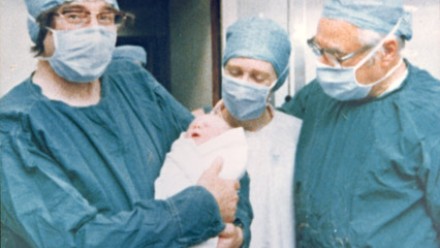Dr. Weeks’ Comment: Robert Edwards passed away this April 2013. Happily he lived long enough to be appreciated for his scientific brilliance in inventing in-vitro fertilization (IVF). How long did he have to wait for recognition by his peers? Just 32 years… He accomplished the healthy birth of the first test tube baby and set the scientific foundation for the births of another 4 million more before the judges gave him a Nobel Prize in medicine… when Dr. Edwards was a frail 85 years old.
“…The 85-year-old emeritus professor at the University of Cambridge was honoured 55 years after he first began his research into fertility and 32 years after the birth of Louise Brown (above with Edwards), the first child to be conceived using in vitro fertilisation – a process by which egg cells are fertilised outside the body…”
This story of science taking 32 years to appreciate such a remarkable breakthrough exemplifies a hazard of being a patient: patients like you (or people you know) face life and death decisions and consider the counsel of medical doctors whose access to scientific breakthroughs is limited by political consensus. This is the “voltage drop” whereby what is discovered and proven and demonstrated TODAY may not be available to save your life for a decade or more. Example: Dr. James Lind of HM Royal Navy figured out how to successfully treat scurvy and wrote a book in 1753 entitled “A Treatise of the Scurvy” . However, here is the tragedy: it took almost 50 years for British doctors back in the UK to adopt the successful cure! It wasn’t until 45 years had passed with countless deaths and suffering that Gilbert Blane, the Chairman of the Navy’s Sick and Hurt Board, declared in 1798 that scurvy can be prevented and treated with citrus in general and limes in particular (hence the Brits are called “limies” and the British Navy no longer needed to hug the coastline when cruising the seven seas and was able to “rule the waves”.) Only then did the “standard of care” catch up with clinical excellence. Any one using Dr. Linds treatments prior to 1798 would be in violation of the “standard of care” and subject to discipline by the doctors guild – regardless of clinical success and grateful patients!
So, if you have a health problem, don’t wait for the majority of scientists to endorse a treatment protocol. Do your study and chose “centisble” heath care options.
IVF pioneer Robert Edwards wins Nobel Prize

The physiologist behind the world’s first test tube baby is awarded the Nobel Prize for medicine
British IVF pioneer Professor Robert Edwards, the man behind the world’s first test tube baby, has been awarded the Nobel Prize for medicine.
The 85-year-old emeritus professor at the University of Cambridge was honoured 55 years after he first began his research into fertility and 32 years after the birth of Louise Brown (above with Edwards), the first child to be conceived using in vitro fertilisation – a process by which egg cells are fertilised outside the body.
Since then, more than four million babies have been born to parents who otherwise would have failed to conceive children.
After serving in World War II, Edwards studied biology at the University of Wales in Bangor, in 1955 he began work on a PhD at Edinburgh University studying the development of embryos in mice.
In the late 1960s he began working with gynaecological surgeon Patrick Steptoe and the pair developed a technique of fertilising human eggs outside the body and then implanting them in the womb. Their efforts came to fruition with the birth of Louise Brown in 1978 and led to the creation of a new field of medicine.
Christer Höög, professor of cell biology at the Karolinska Institutet in Stockholm and a member of the Nobel Assembly explained why Edwards had won the prize. He said: “By a brilliant combination of basic and applied medical research, Edwards overcame one technical hurdle after another in his persistence to discover a method that would help to alleviate infertility.
“This discovery represents a monumental medical advance that can truly be said to confer the ‘greatest benefit to mankind’. Human IVF has radically changed the field of reproductive medicine.”
Although Edwards was too frail to give interviews after the announcement his colleagues paid tribute to him. Mike Macnamee, chief executive of Bourn Hall, the IVF clinic set up by Professor Edwards near Cambridge, said: “Bob is one of our greatest scientists. His inspirational work in the early 60s led to a breakthrough that has enhanced the lives of millions of people worldwide.”
The Nobel award comes with a cash prize of 10m Swedish kronor (around £930,000). ·
Read more: http://www.theweek.co.uk/people-news/11063/ivf-pioneer-robert-edwards-wins-nobel-prize#ixzz2TTog0iQ8
`
`

